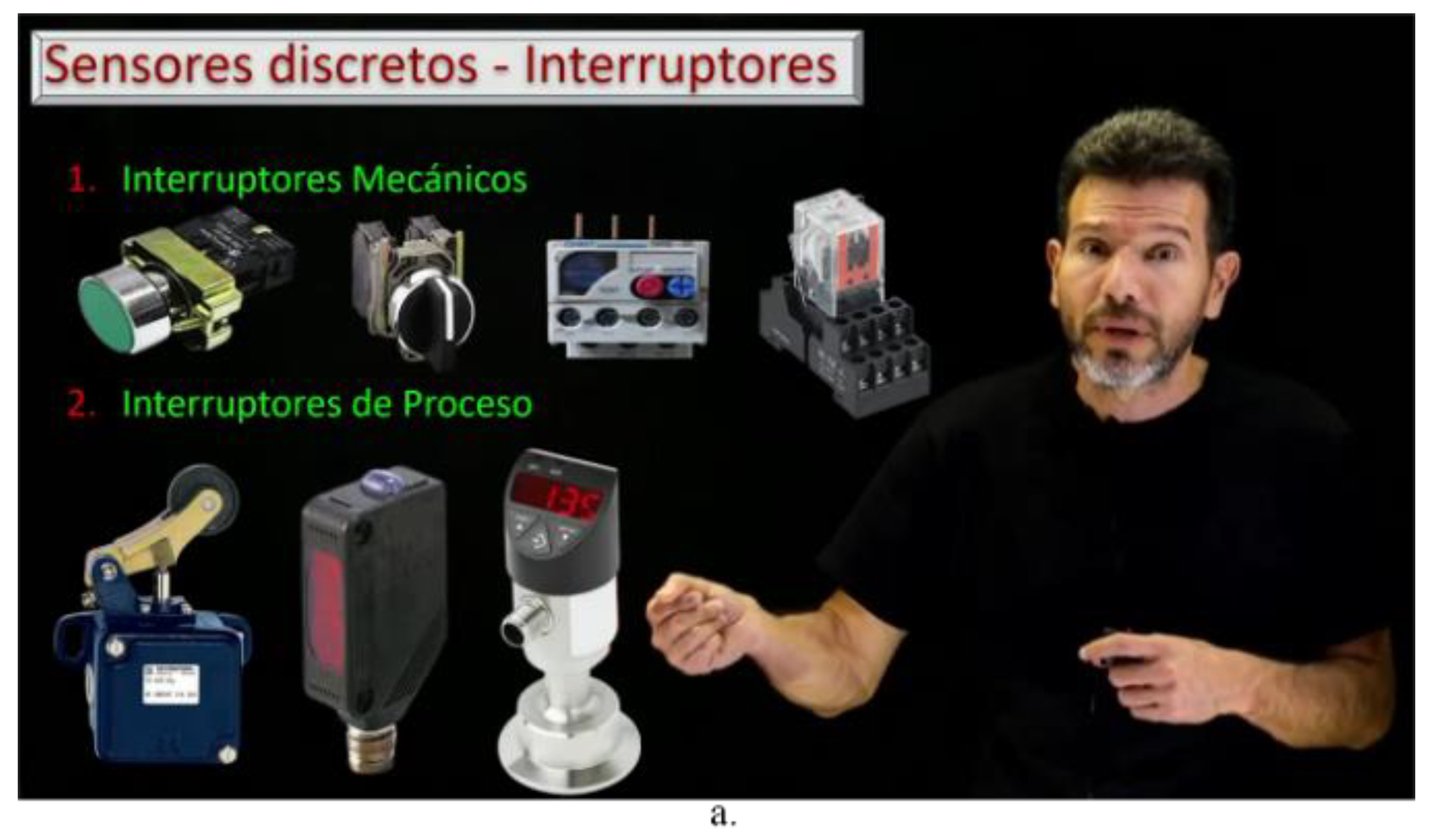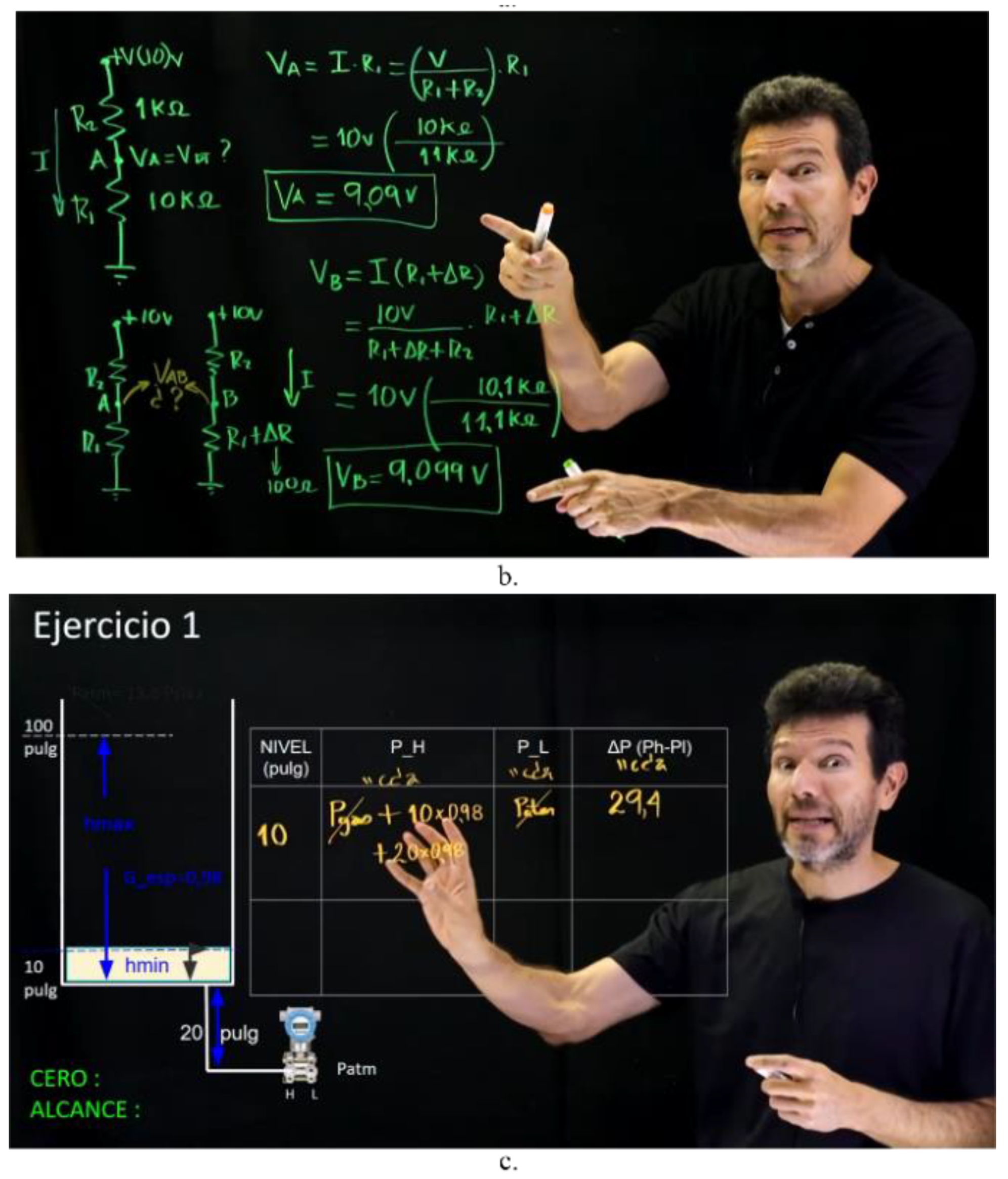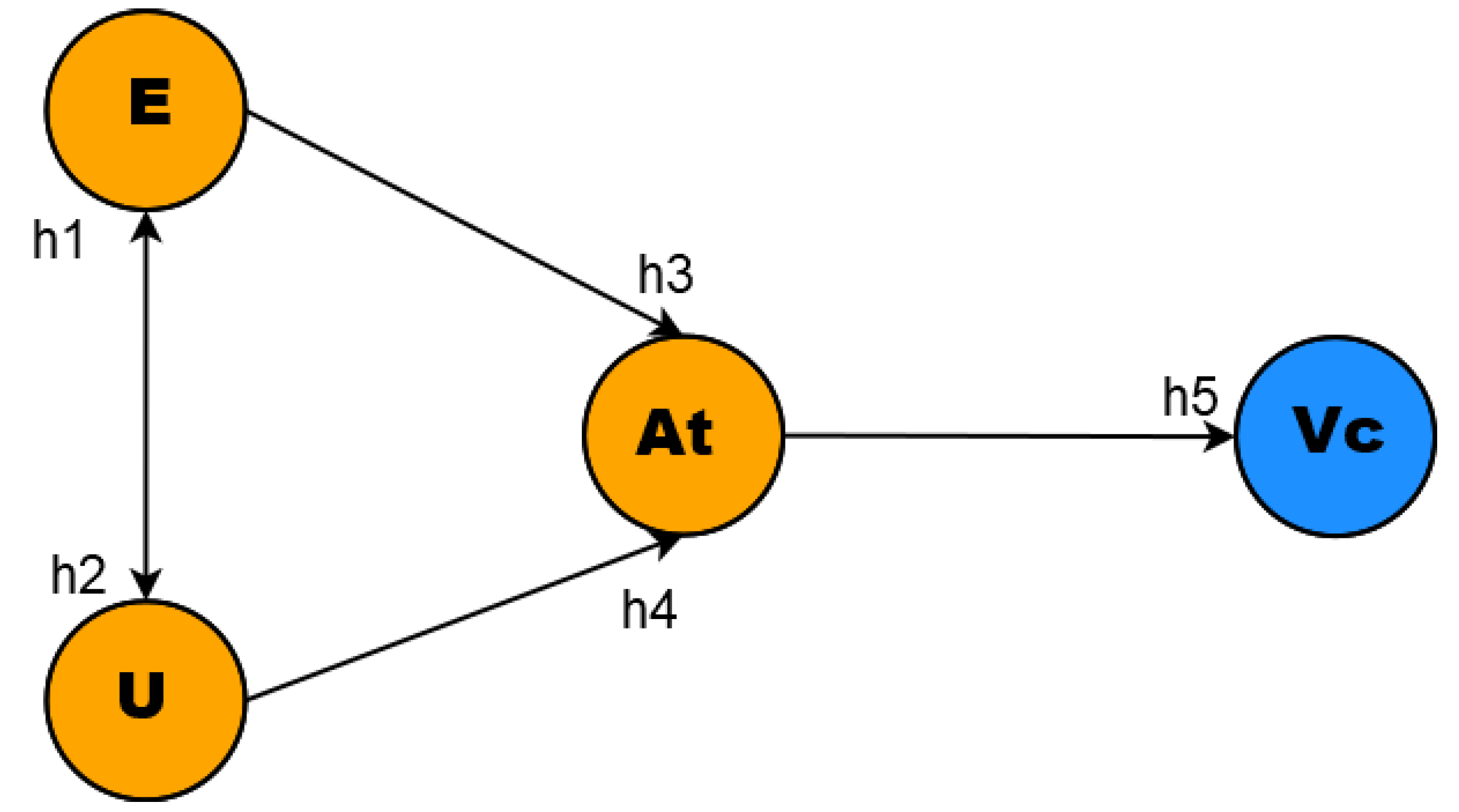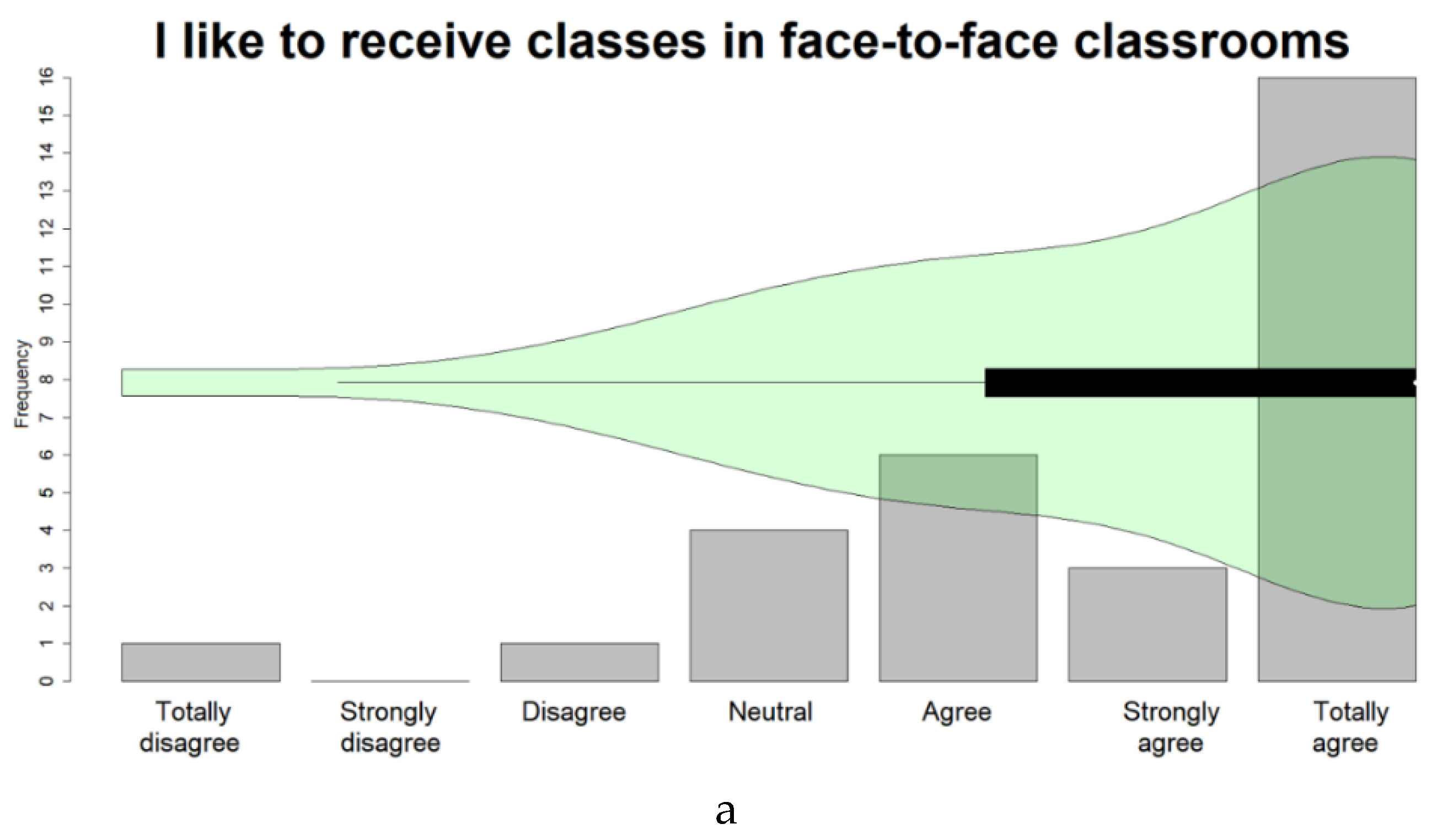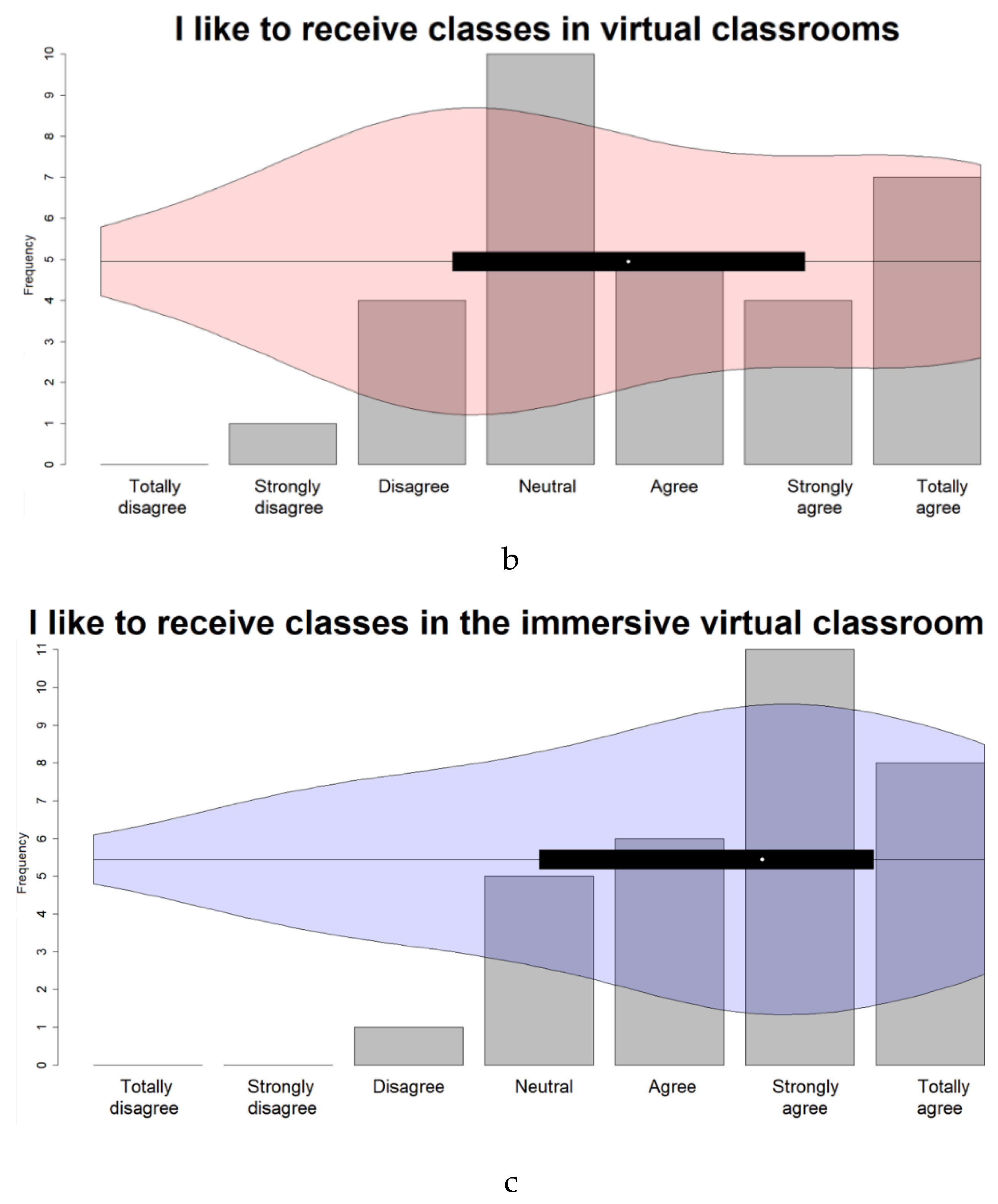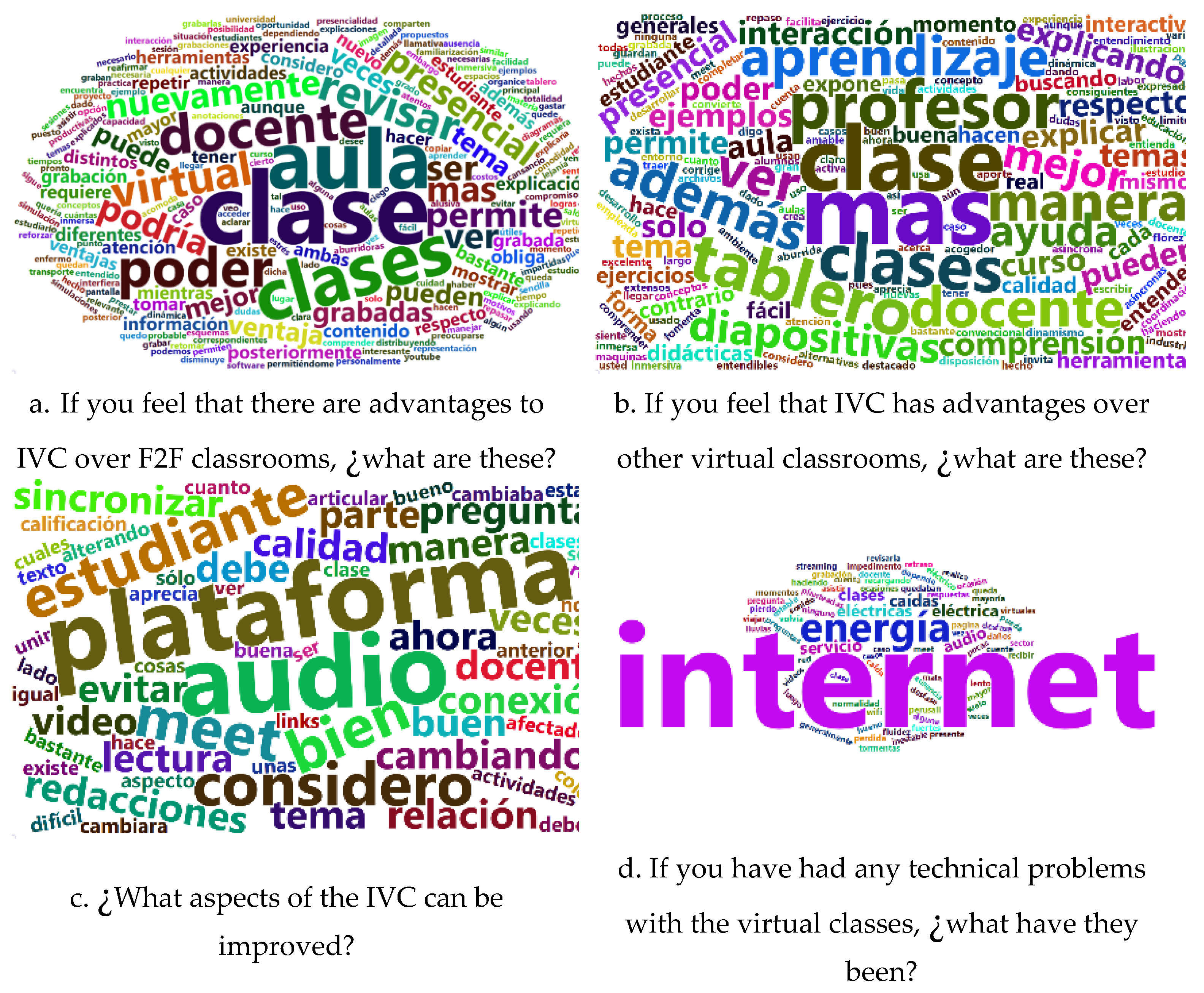1. Introduction
Over the past two decades, research on instructional video has grown and matured, identifying what works and what does not work with this type of technology in terms of learning outcomes and the challenges that still need to be addressed. This research focus is relevant because of the popularity of asynchronous learning through massive open online courses (MOOCs). MOOCs reach millions of students worldwide, but these courses have the highest dropout rates [
1]. The popularity is partly due to two new trends in online learning: the flipped classroom [
2] and the synchronous hybrid classroom [
3]. In both trends, students can rely on instructional videos to prepare asynchronously for the course material before engaging in synchronous learning activities with their instructor. In the second trend when students and instructor meet, they could be organized in different remote groups, fully online, or some face to face (F2F) while others remain online.; these modalities present technical and instructional challenges in developing synchronous online learning activities.
Instructional video has been and continues to be extensively researched in asynchronous online learning, while research on streaming video in synchronous online learning is relatively scarce.
There are several research trends in instructional video for asynchronous learning. Koning B. B. et al., [
1] identified three categories: (1) Extend “traditional” instructional video design principles (e.g., segmentation and transience effect, pacing principle, signaling principle, etc.), (2) Examine the effectiveness of “new” design principles (e.g. camera viewpoint or perspective, video modeling or instructor presence, learning from instructional animations and video-practice condition), and (3) incorporate learner characteristics into the study of learning with instructional video (e.g., learner gender, learner spatial ability, and video model gender).
In the same venue, Fiorella L. & Meyer R. E. [
5] comment on what works and what does not work with instructional videos: a) Two techniques that seem to improve learning outcomes are mixed perspective (first and third person camera) and video segmentation, and b) Some features that do not seem to work are matching the instructor’s gender to the learner’s gender, inserting pauses into the video, adding practice without feedback, and showing the instructor’s face in the instructional video. Meanwhile, Bétrancourt M., & Benetos K. [
6] provide some directions for future research on instructional video: a) The type of content being communicated in the dynamic visualization and the relevance of video to communicate that content, b) How design factors interact with learner strategies and behaviors, c) Design of rigorous experimental studies that guarantee homogeneity of conditions, except for the variables to be evaluated, and their ecological validity, and d) Move from the study of mere instructor presence to specific instructor behaviors expected to influence cognitive processing [
5]. Both studies, the commentators agree that instructor presence is not associated with improved learning outcomes, although it does not worsen them.
In the systematic review by Henderson, M. L., & Schroeder, N. L. [
7], also evaluated instructor presence in instructional videos finding that the results are not consistent in determining whether instructor presence helps improve the learning process, although it does improve student motivation. Similarly ambiguous results regarding instructor presence and learning outcomes were found by Hamza Polat [
8] and Tianjiao Wang et al., [
9]. In the latter [
9], the authors identify two other research topics in instructional videos besides instructor presence: instructor characteristics and content presentation, as recommended in [
5]. Among the various “instructor characteristics” mentioned, it is emphasized that instructors’ pointing, and stress gestures can direct learners’ attention and help them achieve better learning performance [
10]-[
12]. While in “content presentation”, it is emphasized that learners will have better learning performance if instructors draw graphics on blackboards [
13]. Both subjects are of particular interest because they imply that educational video technology should allow instructor to interact in “real time” with material being taught, with all the attendant benefits of pointing gestures, gaze tracking, eye contact, and increased social presence.
Two recent styles of real-time instructional video (which do not require a large investment in post-production) are transparent whiteboards [
14] and instructor behind slides [
15]. This last style is a variant of transparent whiteboards lessons where the slides are displayed in front of instructor, who does not write or draw but, can point and gesture with his body without obstructing the material taught [
15]. As Lubrick M. et al., [
14] points out, more research should be done on instructional videos with transparent whiteboards. The first formal study was conducted by Stull A.T. et al., [
16], whose finding shows that students who watched lessons with transparent whiteboards performed better on immediate post-tests. However, the benefits of learning from transparent whiteboards did not persist on a delayed post-test. Recent studies demonstrate the ability of the transparent whiteboard to enhance instructor characteristics such as eye contact [
17], dynamic drawing [
17], [
18], and gaze guidance [
19] that produce better learning outcomes. These are instructor characteristics included in the five ways to increase the effectiveness of instructional video by Mayer, R. E. et al.,[
20].
There are also research trends in synchronous learning. Annelies Raes et al., [
3] identified three categories related to the learning setting of synchronous hybrid learning environment: a) Hybrid virtual classroom connecting on-site participants with remote individuals, b) Remote classroom connecting groups, c) Remote and hybrid virtual classroom. Acord to findings of Annelies Raes et al., [
3] most of the studies (between 2013 and 2019) were case studies (28 in total), five studies took a comparative approach to study the effectiveness of different modes of delivery and one experimental study was found. For Annelies Raes et al., [
3] synchronous hybrid learning presents both benefits and challenges that fall into two categories: (1) organizational benefits related to educational access and instructional efficiency: increase recruitment rates, offer more elective or specialized courses, more easily consulting outside experts, not teach the same course twice to different classes, and flexibility; and (2) instructional benefits related to the quality of learning: making new contacts around the world, providing equal learning opportunities, ensuring continuity of instruction and promoting student retention, giving students more control over their learning, (1) Instructional challenges: require a variety of teaching methods as well as activating learning activities, require more coordination from instructor, design and implement both instructional strategies and technological systems that enable comparable learning experiences (co-presence), require more self-discipline from students following remotely or online; and (2) technological challenges: maximize the social presence of remote students; ensure that remote students receive the same audio quality as F2F students; address the minor usability issues caused by constant updates of innovative technologies that can confuse, delay, or hinder students’ learning process.
Similarly, in the studies of synchronous video lectures reviewed by Belt E. S. & Lowenthal P. R. [
21], identified advantages, disadvantages, text-based chatting, and participation signals. Regarding the advantages they found that this tightly aligns with F2F instruction, promotes interactivity, helps build community, and provides ways to reach students in different locations; knowledge and use of videoconferencing application features and visual presence support student engagement and flexibility. As disadvantages findings were: balancing the instructor as an authority figure to create community and foster better student performance, technical problems with videoconferencing applications are common (e.g., unstable Internet connection, delayed video, unclear audio), and the requirement to meet virtually online at the same time can be problematic for geographically dispersed courses. Respect to text-based chatting, they found perceptions of text-based chat during video lectures are mixed, but researchers seem to agree that a clear advantage of text-based chat is the ability to provide immediate feedback, so having a colleague or even a specific student manage the chats during a lecture can make it more manageable. The participation signals found were raising hands and voting functions organized interaction and encouraged participation; turning on a webcam or muting indicated intent to participate.
The video used in asynchronous and synchronous discussions analyzed by Belt E. S. & Lowenthal P. R. [
21] revealed that instructor social presence and teaching presence, whether recorded or streamed, are essential to academic discourse. However, research on asynchronous and synchronous video communication in online and blended courses still is limited. The studies of Belt E. S. & Lowenthal P. R. [
21] provide substantive precedents for future research on prompting discussion with video and hosting discussions via videoconferencing. Finally, according to Belt E. S. & Lowenthal P. R. [
21], three areas in need of further research are virtual backgrounds, features and uses of synchronous communication technology (e.g., polling, chat, screen sharing, and presenter rights), and synchronous assessments and feedback. Both aforesaid studies emphasize the importance of the instructor’s social and instructional presence for these synchronous hybrid learning environments to be beneficial, as well as the instructor’s technical competence and willingness. This finding is consistent with results of other authors [
22]-[
24].
During the COVID19 pandemic, the leading role of the instructor combined with technological factors was evident [
25], [
26]. In this sense, it is relevant to highlight observations and practical recommendations from the experience of authors [
27], where they invite to integrate aspects of successful video game design that are relevant for online synchronous learning environments: a) measuring and motivating performance, b) allowing users to interact directly with creators, c) capturing and maintaining user engagement, d) building community, and e) curating content.
Accordingly, both types of learning asynchronous and synchronous share elements related to the importance of the instructor’s social and instructional presence, instructor characteristics, and content presentation. These factors are mediated by the asynchronous and synchronous video communication technology used. In this venue, asynchronous and synchronous learning challenges with instructional videos can be extrapolated to synchronous learning with web video conferencing and live streaming platforms. It is, therefore, essential to research with new styles of instructional video and live streaming, such as those supported by augmented reality [
15], [
16], but that enhance the instructor’s social presence and can be used for both synchronous and asynchronous learning.
Thus, this paper evaluates the perception of an immersive virtual classroom (IVC), used as an augmented reality live streaming platform for the instructor, and its preference compared to a video conferencing platform and the F2F classroom. To the best of our knowledge, studies of perception of augmented reality videoconferencing platforms in synchronous remote classrooms are scarce.
2. Background
Clyde A. Warden et al., [
28] conducted for the first time a nine-year action research study on synchronous distributed learning environments supported by videoconferencing technology up to immersive virtual reality environments. Regarding the experience with limited videoconferencing technologies of the first decade of this century, Clyde A. Warden et al., [
28] emphasize the audio factor (the main issue is audio feedback) on video quality and the need to integrate different support tools when lecturing (such as: chat, mute, hand raising and presentation synchronization). Regarding the experience in immersive virtual reality environments for a large online class to participate with effective instructional delivery Clyde A. Warden et al., [
28] highlight findings that need to be addressed, such as:
As with videoconferencing technology the audio feedback problem persists, compounded by the fact that distance between avatars changes audio intensity and makes it difficult to identify open-mic problems in large classes.
Students’ unwanted manipulation of the space can be controlled with program restrictions, and engagement can be increased with more interesting designs and a richer virtual world. However, designing complex locations and buildings close together can be counterproductive, as this invites exploration. Glass walls and open spaces are preferable so that all avatars can see each other.
Objects within the virtual space require strong management to prevent accidental manipulation by an individual student and the widespread confusion that can result. Another control issue arises because the instructor cannot be sure that students are following instructions or even arriving at designated locations, so the instructor may be overwhelmed by the complexity of the virtual space while managing the class.
A decade after this first research work, videoconferencing technology and virtual world control have improved. However, the pitfalls and promises of learning in immersive virtual reality (IVR) are still prevalent, as Richard E. Mayer et al., mentioned in [
29]. In a 3D virtual environment with a head mounted display implies a high degree of immersion while a 2D virtual environment delivered on a computer screen implies a low immersion. According to the cognitive theory of multimedia learning [
30], [
31], IVR promises to increase motivation to learn, which in turn increases generative processing (anchoring learning by relating it to prior knowledge). However, the pitfall of IVR is to increase learner distraction due to the richness and novelty of the 3D virtual environment, which decreases essential processing (representing what is being taught in their working memory) as the learner focuses on extraneous processing (which does not support the instructional goal) while exploring the “highly” immersive virtual reality [
29]. In contrast, the promise of conventional media (instructional videos, desktop, and slideshow) is that they present less extraneous processing, freeing up capacity for the learner’s essential and generative processing. In addition, if the lesson is well designed, it will focus on the essential material, resulting in better essential processing. The pitfall, however, is that the learner may need to be more motivated to engage with the material being taught and will, therefore, show less generative processing [
29].
According to Richard E. Mayer et al. [
29], the challenge for instructional designers using IVR is to minimize extraneous processing while maintaining appropriate levels of generative and essential processing, while the challenge for designers using conventional media is to foster a high level of generative processing, while maintaining the presentation of a well-organized lesson. To meet this challenge, Richard E. Mayer et al. [
29], in their own experience of 13 comparative experiments on learning outcomes achieved with conventional media versus IVR, concluded that these 13 comparisons did not provide “strong” evidence for the effectiveness of learning academic content in IVR compared to learning with conventional media. One reason is that learning in IVRs can distract students, an observation made previously by Clyde A. Warden et al., [
28]. Finally, Richard E. Mayer et al., [
29] conclude that the effectiveness of academic content-related lessons presented in IVR can be improved by adapting instructional design principles (such as modality, personalization, and pre-training principles) and by incorporating generative learning activities (such as summarizing, responding, and enacting).
This indicates that learning with both conventional media and IVR could benefit from the good use of both internal factors (instructional design principles) and external factors (generative learning activities). This suggestion could be extrapolated to synchronous learning with videoconferencing platforms. However, although the experience with videoconferencing platforms is much more friendly today, there are more tools unified to videoconferencing (such as surveys, interactive boards, grouping, etc.), the video at both ends is still not high resolution, and specific audio problems persist. Therefore, it is necessary to propose to study the perception that would have on synchronous learning, not the use of limited videoconferencing platform, but the use of live streaming platform supported in augmented reality as an intermediate solution of low immersion (involves a 2D virtual environment delivered on a computer screen) between current videoconferencing technologies and IVR.
This paper evaluates the perception of three online synchronous classroom models: a) F2F classroom, b) conventional virtual classroom, and c) immersive virtual classroom during the COVID19 pandemic by undergraduate students at the Universidad of Cauca- Colombia. The conventional virtual classroom mainly uses a videoconferencing platform, while the F2F classroom is the place that students and faculty wanted to return to after the pandemic.
2.1. Immersive Virtual Classroom - IVC
IVC is a streaming platform that incorporates an augmented reality component into materials used in synchronous learning and allows the production of engaging audiovisual educational resources as instructional videos. It requires no post-production time and was developed during the COVID19 pandemic at the University of Cauca [
32]. IVC performs a live composition of audiovisual material (type slides) with video of the instructor, allowing an online interaction of the instructor with his/her slides while the interlocutors watch him in a live transmission in full HD quality (1920 x 1080 pixels) and interact with him/her via audio using a conventional videoconferencing platform.
Four features determine the functionality of IVC in online synchronous classroom between an instructor and his students: a) interactions, b) IVC modes, c) streaming type, and d) augmented reality type.
2.1.1. Interactions in IVC
Student-instructor and student-student interactions are mainly developed in a F2F classroom, as in a synchronous online learning environment. However, the outcome of these interactions highly depends on class dynamics and freedoms that an instructor applies during class [
33]. During a synchronous class in IVC, as in blended courses, student-instructor, instructor-content, and student-student interactions can occur according to the instructor’s teaching-learning dynamics [
34]. However, in IVC, an instructor can perform real-time augmented reality instructor-content (material taught on slides) interaction during the synchronous class. This real-time interaction allows the instructor to perform pointing gestures, eye contact, and gaze orientation, thereby enhancing his or her social presence.
2.1.2. IVC Modes
IVC uses an automated streaming studio that generates the necessary lighting conditions and audio-visual feedback to create an augmented reality environment for the instructor (see
Figure 1a). In the studio, the instructor is positioned behind a dark curtain and lit from three points. While the instructor’s video is composited in real time with video of the slides, the instructor can perform two types of interactions; the first is with the material being taught, thanks to a clicker and visual feedback provided by a composite video monitor. The second level of interaction is with the students via audio, thanks to a traditional videoconferencing platform (see
Figure 1a).
Students have three types of locations in the IVC: a) Distributed: Students are geographically dispersed, each connected from a device with an Internet connection, preferably using a hands-free system (see
Figure 1b), b) Concentrated: Students are in a classroom with an Internet connection and a mic to allow audio interaction with the instructor (see
Figure 1c), c) Hybrid: This case involves both concentrated and geographically dispersed students in the same session. In all three modes, it is possible to have feedback from the students’ video webcam or from the classroom to the instructor via a second monitor.
2.1.3. Streaming type in IVC
IVC has four types of live streaming, depending on combinations with or without video server mediation and one-to-many or one-to-one:
Type 1: The traditional video server - one-to-many. This is how commercial video streaming platforms work. The instructor produces the audiovisual material, transmits it to the cloud, and a commercial video server distributes it to the student consumers with a certain quality and delay. Depending on the type of configuration used in the streaming platform from the producer’s side, there can be delays of 2-5 seconds at the consumers. Type 1 is associated with distributed and hybrid IVC modes (see
Figure 2 a).
Type 2: Video server - one-to-one occurs when the consumer is unique, or all students are confined to a single location. Delays of 2-5 seconds or less also occur, depending on the type of configuration used in the streaming platform. This Type 2 is associated with concentrated IVC mode (see
Figure 2b).
Type 3: Simple peer-to-peer only requires an initial server to connect the IP addresses of the video producer’s computer to the video consumer’s computer; once connected, no additional servers are required, and a high-quality bi-directional connection is established. Delays are in the millisecond range. Type 3 is associated with the concentrated IVC mode (see
Figure 2c).
Type 4: Multiple peer-to-peer requires an initial server to connect the IP addresses of the video producer’s computer to the computers of a small number of video consumers. Once the link is established, no further servers are required, and a one-to-many connection is established, the quality of which depends on the hardware capabilities of the producer’s computer. Delays are on the order of milliseconds. This type 4 is associated with distributed and hybrid IVC mode (see
Figure 2 d).
2.1.4. Type of augmented reality in IVC
The IVC allows three types of augmented reality in the audiovisual material generated for both synchronous and asynchronous learning.
Type 1. The first type combines the audiovisual material prepared for the lesson with the instructor’s video against a black background. In this type of augmented reality, the student observes how the instructor interacts with the audiovisual material through pointing gestures, eye contact and gaze orientation. This interaction takes place thanks to the visual feedback the instructor receives through a monitor (see
Figure 3 a).
Type 2. The second type of augmented reality is generated by simply drawing and writing the prepared lesson material with fluorescent markers on a transparent board and horizontally inverting the video before recording or streaming it (see
Figure 3 b).
Type 3. The third type combines the previous two types of augmented reality. This third option takes advantage of the ease of preparing visually appealing material with the ability to write on a transparent board with fluorescent markers. The IVC combines the two videos in real time and provides visual feedback to the instructor, allowing them to interact with the audiovisual material and the writing on the board (see
Figure 3c).
5. Conclusions, limitations, and further work
IVC is a virtual classroom model that allows both synchronous online classes and the generation of audiovisual educational resources in the form of instructional videos with augmented reality elements, more engaging and with a low level of post-production. The COVID19 pandemic has made it possible to experiment and improve virtual classroom models supported by videoconferencing and evaluate teaching-learning models for F2F, blended and online environments. Given the current limitations of videoconferencing platforms and the need for further research in instructional videos on how to integrate aspects such as instructor characteristics and content presentation, it is recommended to experiment with transparent whiteboard and instructor behind-the-slides video styles in both asynchronous and synchronous learning, thus taking advantage of both the social and instructional presence of the instructor by producing audiovisual material without high post-production costs.
Despite students’ preference for IVC over the virtual classroom supported by video conferencing, the life experience, and other benefits of what happens in an F2F classroom cannot be easily replaced. However, there is a need for the instructor to integrate into the classroom (regardless of type) technological tools to support instruction (e.g., simulation software, design software, game software, assessment software, lecture and video management software, etc.), alternative instructional models, and even other assessment mechanisms that together enhance any of the three classroom models (F2F, virtual, and IVC).
A valuable lesson learned from the COVID19 pandemic virtual classrooms is that one should not return to F2F classrooms with the same pre-pandemic teaching-learning practices [
57]. We recommend to use a blended approach, because it encouraging pre-preparation of course material (e.g., providing IVC-type instructional videos: encouraging essential processing) by students and using the classroom (virtual or F2F) to conduct dynamic activities that encourage generative processing, resulting in enhanced student learning.
This study has several limitations. First, the study examined student preference for IVC over virtual classroom (videoconferencing) and F2F in the same group of students. The researchers in this study developed the technology during the COVID-19 pandemic and assessed preference based on feedback from students in an engineering program. However, the technology has yet to be evaluated by experts outside the Universidad of Cauca. Second, the students belong to two courses in the same engineering semester. Third, the main method of the study was survey research. The novelty effect of the IVC may have increased the likelihood that student responses would be a helpful outcome variable in this study. However, we evaluated the external validity with other similar studies showing the consistence of our results.
Given the importance that online synchronous learning has taken as future work in IVC is proposed, first, to conduct a study of instructor’s social presence mediated by IVC in a synchronous online class and, second, to evaluate IVC not only in their perceived favorability but also in the impact on learning outcomes in other configurations of IVC mode as concentrated and hybrid.


